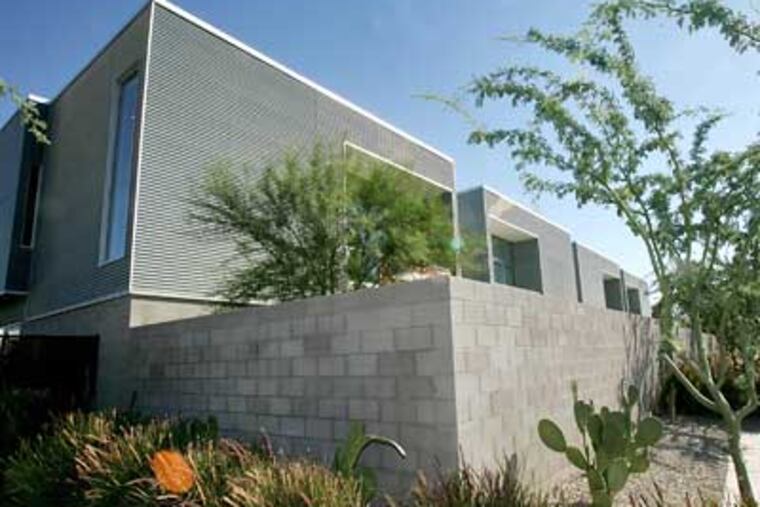Demand dims for energy-efficient homes
PHOENIX - Home builders slapped on solar panels and added other eco-friendly enhancements as energy prices soared earlier in 2008, hoping greener homes would lure reluctant buyers.

PHOENIX - Home builders slapped on solar panels and added other eco-friendly enhancements as energy prices soared earlier in 2008, hoping greener homes would lure reluctant buyers.
But since July, the cost of oil has plunged from $147 a barrel to about $44, while home prices continued to fall. The headwinds have stalled low-energy housing developments around the country.
"The program doesn't necessarily pencil out at the moment," said Scott Kramer, a planner for Meritage Homes Corp., of Scottsdale, Ariz., which builds homes in Texas, Arizona, California, Nevada, Colorado and Florida.
"People don't seem to be willing to pay for it."
In 2007, Meritage packed $20,000 worth of solar panels, high-performance insulation, low-leakage air ducts, and other systems in its first green community in Vacaville, Calif. The Encore homes promised to slash electric bills up to half, and buyers snapped them up even though Meritage offered them at a higher price than nearby competitors.
Sales figures in July showed that the Encore development sold 1.55 homes per week, compared with 0.88 homes per week for similar homes in the same city, Kramer said.
But that advantage disappeared in the second half of the year. Meritage and its closest competitor both sold about one home every two weeks, according to sales data for November, and it slashed prices that month to make Encore homes about the same as its competitors'.
UBS AG analyst David Goldberg said most major builders would continue to invest in green developments. But they will likely need to find cheaper ways to do it.
"If it costs more to put solar panels on there, are you still exploring it? I'd say, maybe not," Goldberg said. "But there are a lot of things you can do in communities that are environmentally friendly."
For example, builders could add Energy Star-rated appliances in homes that can cut utility bills without adding much to the overall price tag, he said.
The economy may have left consumers jittery, but those looking for new homes will still look for energy efficiencies, especially if a builder can show how much it will lower their monthly utility bills.
"If it's a house that has leaky windows, and not enough insulation, I think people will pick up on that," added Elliott Pollack, a real estate consultant in Scottsdale.
Phoenix home builder Ed Gorman agrees.
"Everybody wants to be green, but nobody wants to pay for it," said Gorman, president of Modus Development. "But when you talk about putting money in our pocketbook, that's important to them."
Gorman's Galleries at Turney project, two rows of pricey, ultramodern townhouses, sold out in 2008 while similar projects struggled to find buyers. His secret? The Galleries were equipped with a set of cooling systems that lock out Arizona's oppressive summer heat.
Shea Homes, one of the nation's largest private builders, also is putting off more green projects after some initial success with its Trilogy communities in Washington, California, Arizona and Florida. Shea offered dual-pane windows, high-tech ventilation systems, high-performance insulation, and other enhancements. In August, it added 3-kilowatt solar panels for free.
The move helped Shea expand its market share from January to August 2008, said Rick Andreen, president of Shea Homes Active Lifestyle Communities.
Since then, sales have flattened to about one home per week at Victoria Gardens, reflecting a national drop in home sales, Andreen said.
Andreen said Shea would delay several new Trilogy communities.
"Once we see sales taking place," Andreen said, "then we'll be able to pull the holding pattern off of these projects and get them done."